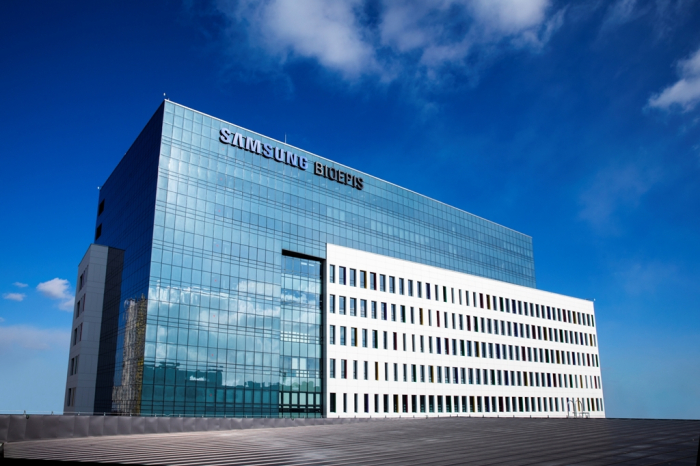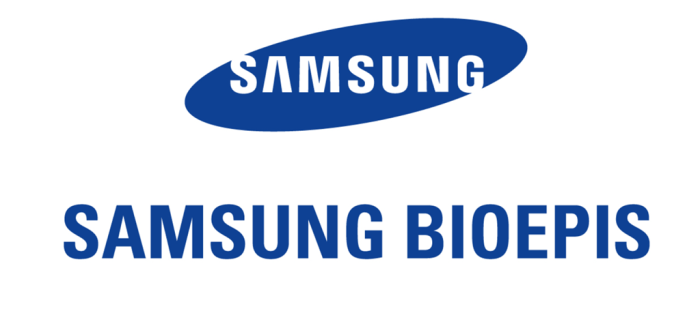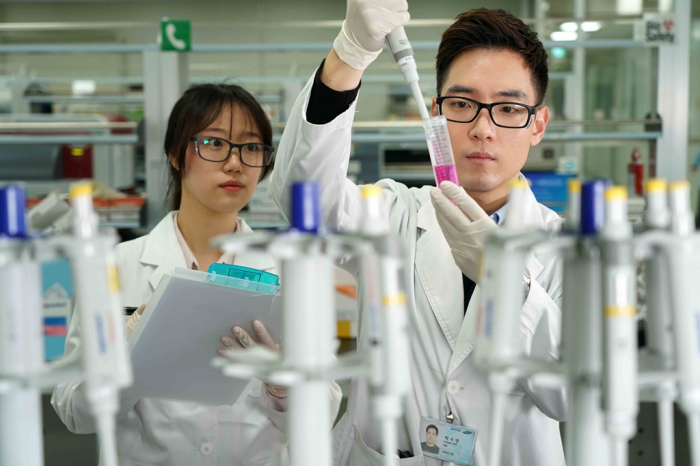Bio & Pharma
Korean court rules in favor of Samsung Bioepis over Regeneron’s Eylea
The ruling will likely clear one hurdle in Samsung’s efforts to enhance its presence in the global biosimilar market
By Feb 21, 2025 (Gmt+09:00)
2
Min read
Most Read
LG Chem to sell water filter business to Glenwood PE for $692 million


KT&G eyes overseas M&A after rejecting activist fund's offer


Mirae Asset to be named Korea Post’s core real estate fund operator


StockX in merger talks with Naver’s online reseller Kream


Meritz backs half of ex-manager’s $210 mn hedge fund



A South Korean court on Friday ruled in favor of Samsung Bioepis Co. in a patent dispute against Regeneron Pharmaceuticals Inc., a US pharmaceutical firm.
The Seoul Central District Court ruled against Regeneron, which had sought to block Samsung Bioepis from producing and selling a biosimilar referencing the US firm’s Eylea, a blockbuster medicine used to treat various eye conditions.
Regeneron filed a complaint with the court against Samsung in January 2023, claiming that the Korean firm’s biosimilar Afilivu violated Eylea’s patent.
Eylea, developed by Regeneron, is the world’s leading treatment for age-related macular degeneration, a common cause of blindness in older adults. Since its launch in 2013, Eylea has become a major revenue driver for Regeneron. The drug’s 2023 global sales reached $9.38 billion, including 96.8 billion won ($67.5 million) in Korean sales.

Industry watchers said the court ruling will likely clear one hurdle in Samsung’s efforts to enhance its presence in the global biosimilar market, which is valued at over 12 trillion won, or $8.4 trillion.
It is not immediately known whether Regeneron will appeal the case to a higher court.
Samsung Bioepis, wholly owned by Samsung Biologics Co., a biopharmaceutical unit of Korea’s top conglomerate Samsung Group, launched Afilivu, the Eylea biosimilar, in Korea last May.
Biosimilars are near-identical copies of biologic drugs that offer similar efficacy and safety profiles at a lower cost.
Eylea’s patents have expired or are set to expire across key markets. Its composition-of-matter patent expired in Korea in January 2024 and in the US in May 2024. It is set to expire in Europe in November 2025.

KOREAN PHARMA CIRCLE WELCOMES COURT RULING
The Korean pharmaceutical industry welcomed the court ruling, citing concerns that dominant players often use litigation to delay competition.
“The ruling is judicial support for biosimilar manufacturers. We hope it will strengthen Korean biosimilar firms’ competitiveness in the global market,” said an industry official.
Other legal hurdles remain, however.
Last week, Regeneron filed an injunction with the same court against Samsung Bioepis, requesting a sales ban on Afilivu in Korea, citing other reasons. The court accepted Regeneron’s injunction request.
In the US, Samsung Bioepis has been in a patent dispute with Regeneron since December 2023.
Write to Dong-jin Hwang at radhwang@hankyung.com
In-Soo Nam edited this article.
More to Read
-

-
 Bio & PharmaSamsung Bioepis to enhance biosimilar presence with Epysqli
Bio & PharmaSamsung Bioepis to enhance biosimilar presence with EpysqliJun 12, 2023 (Gmt+09:00)
3 Min read -
 Bio & PharmaSamsung Bioepis’ SB12 shows same clinical effects as Alexion’s Soliris
Bio & PharmaSamsung Bioepis’ SB12 shows same clinical effects as Alexion’s SolirisJun 14, 2022 (Gmt+09:00)
1 Min read -
 Bio & PharmaSamsung Bioepis sees greater market for Byooviz eye disease biosimilar
Bio & PharmaSamsung Bioepis sees greater market for Byooviz eye disease biosimilarJul 18, 2022 (Gmt+09:00)
2 Min read -
 PharmaceuticalsSamsung Bioepis to double biosimilars, may resume Nasdaq listing plans
PharmaceuticalsSamsung Bioepis to double biosimilars, may resume Nasdaq listing plansFeb 24, 2022 (Gmt+09:00)
3 Min read -
 Mergers & AcquisitionsSamsung buys $2.3 bn Bioepis stake from Biogen to end partnership
Mergers & AcquisitionsSamsung buys $2.3 bn Bioepis stake from Biogen to end partnershipJan 28, 2022 (Gmt+09:00)
3 Min read
Comment 0
LOG IN


